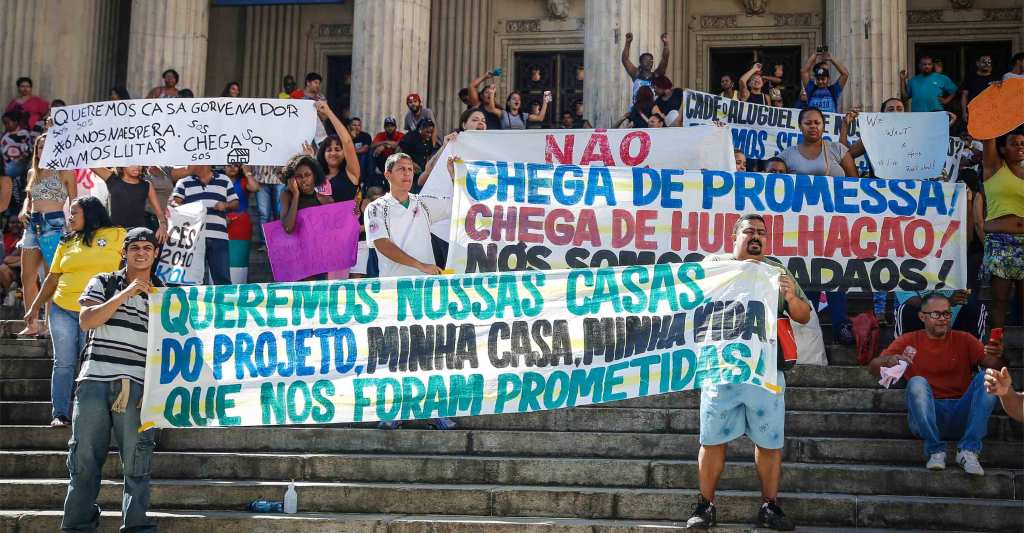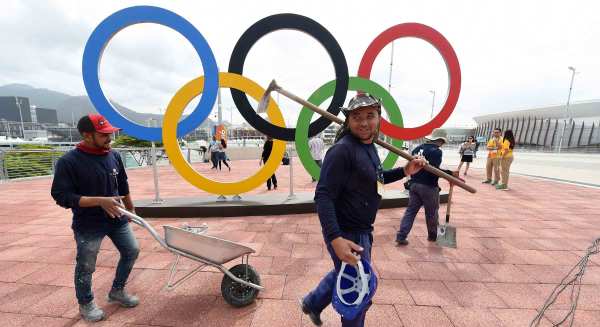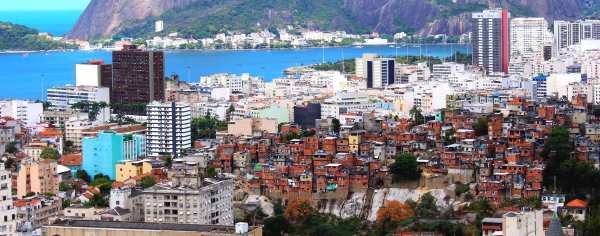
With just over one day to go until the 2016 Summer Olympics kickoff in Rio de Janeiro, the Olympic legacy already falls short of its initial promises to the city. Rio is still dealing with inadequate and unfinished infrastructure projects and overinflated costs, on top of the economic and political instability facing Brazil. These unfilled promises mimic the disorganization and corruption from the 2014 World Cup in Rio. Both games brought promises of meaningful transformations for Rio’s citizens, but instead ended up violating human rights, increasing public debt, and concentrating expensive infrastructure mostly in developed neighborhoods.
Six million people live in the city of Rio de Janeiro, and one in four of them are poor residents living in slums called favelas. In preparing for the World Cup and Olympics, the city government announced a comprehensive development plan that they called the social legacy plan. The favelas have long been starved of investment in public infrastructure, so the prospect of new developments and upgrades was exciting. Instead, the plan only further segregated poor residents. In Providencia, Rio’s oldest slum, the main project was the construction of a $20 million cable car. While developers promised the cable car would connect residents to jobs, in reality 30 percent of residents were threatened with forced evictions to make way for the project. Not only was the community unaware of the project beforehand, but it also had no input in the draft planning or approval processes.
The damaging effects of the Olympics on Rio’s poor residents
Widespread threats of forced removals of citizens from their neighborhoods for development projects related to major sporting events in Rio have been controversial. The Popular Committee on the World Cup and the Olympics— a civil society network comprising social movements, NGOs, research centers and universities— estimates that from 2009 to 2015, 22,059 families were forcibly uprooted from their homes for development projects related to these events. Agencia Publica, an investigative journalism outlet and a Ford Foundation grantee, told the stories of 100 evicted families, providing them a voice through one of the largest multimedia investigations related to the Olympics. According to Agencia Publica’s co-director Natalia Viana, these firsthand stories provide “concrete evidence of serious human rights violations, of the right to housing, to freedom of movement, to information and even freedom of expression.”
Fifty days before the opening of the Olympics, the governor of Rio declared a state of financial emergency and asked for federal support to avoid a collapse in public security, health, education, transportation, and environmental management. The cost of the Rio Olympics is estimated to be more than $10 billion and that does not include all of the tax exemptions, public loans, and fiscal incentives that have not been disclosed. The government gave special legal exemptions to developers, allowing them to circumvent planning and urban laws, restrict civil liberties, waive mandatory environmental analyses, ban local and informal businesses, and criminalize public protests. The NGO Justiça Global, another Ford partner, produced a video series of four episodes telling how such measures are felt disproportionately by those who are already not well protected, such as those with insecure housing, informal jobs, or already suffering from marginalization and discrimination.
For example, more than 90 percent of the 900 families living in the low-income community of Vila Autodromo were forcibly relocated to make way for the Olympic Park, even though most of them held land concessions titles granted by the state. Although compensation and nearby alternative housing was offered, many families resisted leaving, prompting violent clashes with police. The residents felt they were excluded and disturbed by the games for the capital interests of wealthy developers.
In reaction to the negative impacts related to these infrastructure projects, Rio’s government has responded by blocking access to information and reducing transparency. The organization Article 19, another Ford grantee, put in 39 Freedom of Information requests on the impact of the construction of the Transolimpica bus rapid transit system on the lives of the families whose homes are in the way of the new bus system. But only one was fully answered. It was impossible to find out information on the final route of the bus system, although hundreds of families had already been forcibly displaced.
Additionally, more than 2,500 people killed by the police in Rio since 2009, as reported by Ford grantee Amnesty International. In the month of May alone, 40 people were killed by police officers on duty in the city and 84 across the state. The communities most affected by this violence are those living in slums located around the main access routes to and from the international airport and competition arenas.
Involving communities to ensure shared benefits
While cities agree to host major sporting events based on the premise that the resulting development and legacy will benefit everyone, wealthy developers are usually the ones that get all of the gains at the expense of residents, especially those who are poor and marginalized. So what is happening in Rio is not a new story.
What is new is that communities in Rio are starting to push back. A robust civil society network came together to monitor and collect information on development processes, expenditures, and rights violations. It helped residents speak out against harmful development plans and get compensation for those being displaced. The network submitted reports to international organizations, including the Inter-American Commission on Human Rights and various United Nations mechanisms. Communities became the defenders of their own rights, and they sought the assistance of powerful institutions like the Public Defender’s Office and the UN Special Rapporteur on Adequate Housing, leveraging alternative planning and national and international advocacy.
The alliances established between communities and relevant stakeholders were unfortunately not enough to reconfigure the existing power relationship between the city government and the residents. The laws that were passed to relax tender regulations and urbanistic controls did not ban forced evictions or set procedural safeguards, and there was no broad public debate over the nature of improvements needed.
Governments and public managers still need to learn how a city can stage world events successfully while also respecting the rights of the communities living in the path of infrastructure projects. Participatory development and stricter international regulation is a good place to start. Just like how government and business elites organize and lobby to host these games, we must help communities organize and defend their rights to ensure that they are truly benefitting from the development and investment associated with these games.


